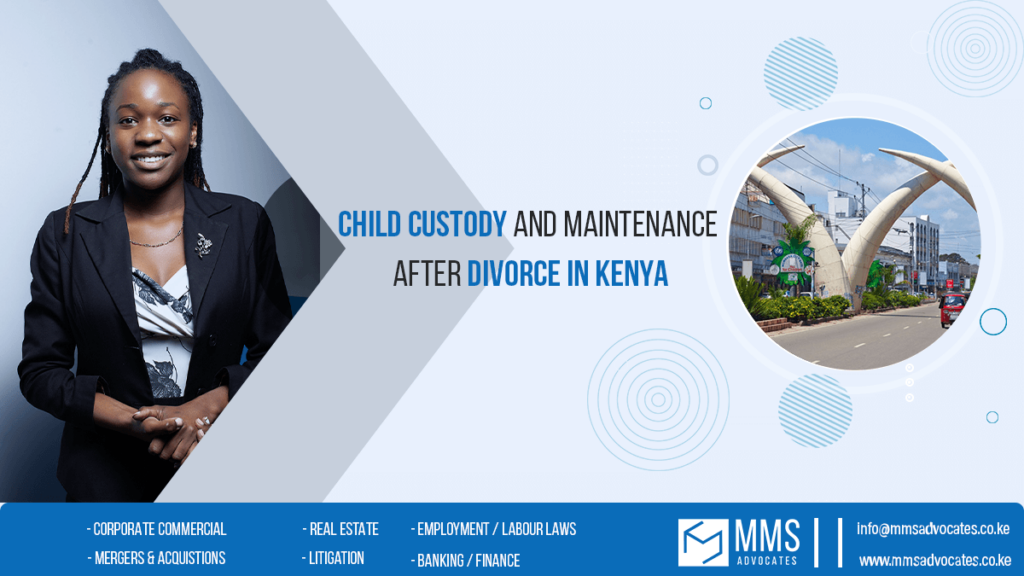
Child custody and parental responsibility considerations often arises where parties are not married, after a divorce or the death of both parents to allow for the child’s upbringing. In Kenya, a child has the right to parental care and protection, which is an equally shared responsibility of both the parents to provide for the child, whether they are married to each other or not.[i] A child’s best interests are of paramount importance in every matter concerning the child and thus the law provides for issues of child custody and maintenance.[ii]
A child in Kenya is defined as a human being below the age of eighteen years.[iii] Child custody is defined in the Children’s Act to mean so much of the parental rights and duties as relate to the possession of the child.[iv] Child custody can either be legal custody or actual custody.
Legal custody is the parental rights and duties that relate to possession of a child as conferred by a custody order.[v] The duties include the duty to maintain the child and provide them with basic needs as well as the duty to protect the child from neglect, discrimination and abuse. Actual custody, also known as physical custody is the actual possession of a child, whether or not the possession is shared with one or more persons.[vi] This ensures the stability of the child so that the child is able to attend school without much disruption of jumping from one home to another.
Parents could be granted joint legal and actual custody where responsibilities are shared between them or a joint legal custody to both parents but physical custody to only one parent. An example of where parents are given a joint legal and actual custody is where the court orders the parties to prepare a joint custody agreement.[vii] This is an agreement that allows the child to spend time at both parents’ residences, it is beneficial as it ensures that the child maintains regular contact with both parents. It caters for when and how exchanges happen, childcare arrangements, education, health among other issues that would be relevant for the child’s upbringing.
Joint legal custody does not limit the other party from visiting the child and often occurs in a situation where it is impossible for both parents to take up actual custody. This may happen for example where, parents live in different countries or where the child has been living with one of the parent all their life and thus, it would be disruptive for the other party to take physical custody of the child.
Custody is granted upon the application of either a parent, guardian, any person who applies with the consent of a parent and a guardian of the child and has had actual custody of the child for three months preceding the time of making the application or any person who can show cause why an order should be awarded to them.[viii] Sole custody may be granted where one party is declared unfit to raise a child.
The Children’s Act in Part VII lays out considerations that the court regards before making an order, for example the wishes of the child concerned, the child’s physical, emotional and educational needs, any harm that the child might have suffered and the likely effect on the child of any change in circumstances.[ix]
Maintenance of children is the duty of parents to provide for the basic needs of the child. Section 23 of the Children’s Act lays a duty to maintain the child and provide with adequate diet, shelter, clothing, medical care including immunisation, education and guidance.[x] The Children’s Act in Section 91 provides that a parent, guardian or custodian of the child may apply to the court to compel the other party to pay maintenance for the child.[xi]
The court considers the financial ability of each parent in giving an order.[xii] This will require the parents to swear an affidavit of means which shows how the parents earn, vis a vis how they spend. Where the parent violates the order, it is a contempt of court and risks a jail term.
In conclusion, the idea behind child custody and maintenance is the best interest of the child. It is thus important for parents to provide for the child and to safeguard and promote their rights and welfare.
For more information or assistance with child custody and maintenance in Kenya, contact us on wkuyoh@mmsadvocates.co.ke or info@mmsadvocates.co.ke
[i] Article 53 (1) (e), Constitution of Kenya (2010).
[ii] Article 53 (2), Constitution of Kenya (2010).
[iii] Section 2, Children Act (Act No.8 of 2001).
[iv] Section 81 (1) (a), Children Act (Act No.8 of 2001).
[v] Section 81 (1) (c), Children Act (Act No.8 of 2001).
[vi] Section 81 (1) (d), Children Act (Act No.8 of 2001).
[vii] J.K.N v H.W.N (2019) eKLR.
[viii] Section 82 (3), Children Act (Act No.8 of 2001).
[ix] Section 83, Children Act (Act No.8 of 2001).
[x] Section 23, Children Act (Act No.8 of 2001).
[xi] Section 91 (1), Children Act (Act No.8 of 2001).
[xii] Section 76 (3) (f), Children Act (Act No.8 of 2001).